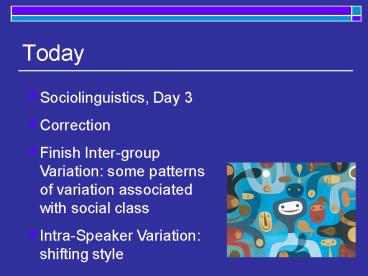Today PowerPoint PPT Presentation
1 / 16
Title: Today
1
Today
- Sociolinguistics, Day 3
- Correction
- Finish Inter-group Variation some patterns of
variation associated with social class - Intra-Speaker Variation shifting style
2
coke pop soft drink soda tonic cocola
3
Lexical differences
- Words for sweetened carbonated beverage
- Coke CA, New Eng.
- Soda South, East
- Pop Midland North, West
- Tonic Boston
- Cocola Georgia, Tennessee
4
Overt vs. Covert prestige
- Overt prestige
- Value attached to a particular dialect by the
community at large that defines how people should
speak to gain status in that community. - Covert prestige
- Value attached to a particular dialect or
minority group language by a subset of the
community (local group, ethnic group).
5
Social class and dialect
- William Labov
- New York City r-lessness
- Studied variation in r pronunciation as it
relates to socioeconomic class
6
Dept Store study - Method
- Interviewed salespeople at Saks 5th Ave.,
(upper), Macys (middle), S. Klein (lower class) - Excuse me, where are the womens shoes?
- Fourth floor. (casual speech)
- Excuse me?
- Fourth floor. (careful speech with emphasis)
7
Dept Store study - Results
Klein Macys Saks
Casual 8 44 63
Careful 18 61 64
Lower Middle Upper
Percentageof rs produced
8
Dept Store study - Conclusions
- Pronunciation of r increased
- w/ level of socio-economic class
- w/ attention level paid to speech (careful or
casual) - w/ listener (perceived middle-class)
- Variation most prominent among lower class
speakers - Why?
- Overt prestige
9
Phonological markers of style
- Casual, informal style marked by increased speech
rate - unstressed vowels deleted, replaced with schwa,
e.g., - casual ptHeIR vs. careful pHtHeIRoU
- deletion of word final consonants, unstressed
syllables (jus, don) - use of contractions (wanna, gonna, coulda)
potato
10
Phonological markers of style
- pronunciation of (-ing) vs. (-in) in 3 different
speech situations - casual style vs. interview vs. reading
- idIn idIN
- pronounciation of -ing increased as formality/
attention paid to speech increased
11
Lexical markers of style
- Slang words and expressions used in very
informal settings (common slang), often to
indicate membership in a particular social group
(in-group slang) - usually has short lifespan
- swell, neat-o, groovy
- daddy-o
- It stinks!
- can become standardized
- phone, fridge, fan, blimp, hot dog
12
Syntactic markers of style
- Casual speech characterized by
- increased use of non-standard constructions
(e.g., double negatives, double modals) - shorter, more concise sentences
13
- but
Social Class Ethnicity Formality of
setting Topic Age Can cause speakers to shift in
other ways, too
14
Code-switching as style-shifting
- Code-switching alternation between two or more
languages (or dialects) in a single sentence or
conversation. - Occurs for the same reasons monolinguals shift
styles change in formality of the situation,
listener, topic
15
Examples
- EnglishSpanish
- Sometimes I begin my sentences in English, y
termino en español. - Swahili (Kenya)English
- employee?employee (same ethnicity) Swahili
- employee ?employee (differing ethnicity) mixed
SwahiliEnglish - employee ?supervisor mixed SwahiliEnglish
16
Examples
- Fanakalo (South Africa)English
Foreman Hau, Wena Foreman Ini ndaba you late
lafa lo job, hey? Employee My abject apologies,
Sir, I encountered extreme difficulty In
obtaining transport.
17
Hypercorrection
- The act of producing nonstandard forms by way of
false analogy, often to imitate the standard
dialect - Phonological r-insertion
- Cuba(r), idea(r)
- Grammatical
- Lets keep this between you and I.
- I dont know whom he is.
18
Marthas Vineyard study
- William Labov
- Marthas Vineyard, MA
- diphthong centralization I, U in why, wow
- (compare w/ standard a I, aU)
19
Marthas Vineyard study - Results
- Native islanders centralized, tourists didnt
- regional effect
- Students planning to go to college and return to
island centralized more than students not
planning to return - Portuguese immigrant community showed high degree
of centralization
20
Marthas Vineyard study - Conclusions
- How closely speakers identified w/ island was
positively correlated w/ degree of centralization - ? seeking covert prestige
- Dialect is an important factor in group identity
21
Summary
- Standard vs. non-standard dialects
- Overt vs. covert prestige
- Dept. store study influence of standard
dialect, overt prestige - Marthas Vineyard study influence of
non-standard dialect, covert prestige

